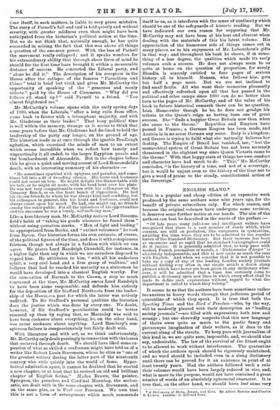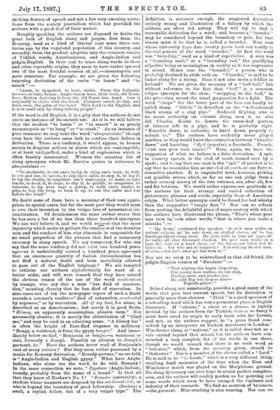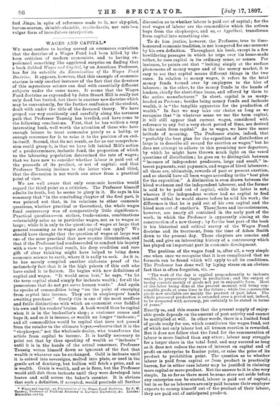ENGLISH SLANG.* THis is a popular and cheap edition of
an expensive work produced by the same authors some nine years ago, for the benefit of private subscribers only. For which reason, and because the original volumes have undergone some revision, it deserves some further notice at our hands. The aim of the authors can beat be described in the words of the preface :—
" Of late years many judicious and intelligent writers have recognised that there is a vast number of words which, while current, are still on probation, like emigrants in quarantine, awaiting the time when they are to be admitted to the regular haven of the Standard Dictionary. But their increase has been so enormous and so rapid that no standard lexicographer could do it justice. It is generally admitted that, to keep pace with modern French journalism or novels, a Dictionnaire d'Argot ' is absolutely indispensable, and this is now quite as much the case with English. And when we consider that it is not possible to take up a copy of any of the leading London society journals without finding very often in one single article a dozen slang phrases which have never yet been given in any dictionary what- ever, it will be admitted that a time has certainly come to publish a dictionary upon new lines in which every effort shall be made to define such expressions without regard to what the department is called to which they belong."
It seems to us that the authors have been sometimes rather too anxious to hurry words through that judicious period of quarantine of which they speak. It is true that both the
Sporting Times and the Bird o' Freedom—who, by the way, will be modestly pleased with their description as "leading
society journals "—are filled with expressions both new and strange ; but one shrewdly suspects that this new language of theirs owes quite as much to the poetic fancy and picturesque imagination of their writers, as it does to the current slang of the streets. To keep pace with journalism of this kind is, we are quite sure, impossible, and, we should also say, undesirable. The law of the survival of the fittest ought to be allowed to work without interference. The quarantine of which the authors speak should be rigorously maintained, and no word should be included even in a slang dictionary until there can be proved for it an existence in print of at least twenty years. Had the authors followed such a rale their volumes would have been largely reduced in size, and, what is more to the purpose, would not have contained a great number of words of an absolutely ephemeral character. It is true that, on the other hand, we should have lost some very
• A Dictionary of Slang, Jargon, and Cant. By Albert Barrilre and Charles G. Leland. London : G. Sell and Sons.
striking flowers of speech and not a few very amusing quota- tions from the society journalism which has provided the authors with a good deal of their matter.
Roughly speaking, the authors are disposed to derive the great bulk of English slang and jargon, first from the Romany, used as a kind of thieves' cant some three cen- turies ago by the vagabond population of this country, and secondly, from the gradual adoption into the common tongue of Yiddish words, Americanisms, and Anglo-Indian and pidgin-English. In their zeal to trace slang words to these and other reputable origins, they seem to have rather ignored two of the most fruitful sources of, all,—onomatopoeia and mere nonsense. For example, we are given the following imposing derivation of the verbs "to lamm" and "to smack "
" Lamm, to (popular), to beat, strike. From the Icelandic hiemma, to butt, bruise ; Anglo-Saxon lama, Irish lamh, old Norse, lamr, Hotten deriving it from the old Norse lass, hand. Lam is originally to strike with the hand. Compare smack, to slap, and Irish mac, the palm of the hand. This word is old English, and is now used only by slang-talking people."
If the word is old English, it is a pity that the authors do not quote an instance of its ancient nee. As it is, we still believe that the modern "to Lamm" or "to smack" is as purely enomatopceic as "to bang" or "to crash." As an instance of pure nonsense we may take the word "absquatulate," though even here the authors seem loth to confess their failure in derivation. There is a tendency, it would appear, in human nature to disguise actions or states which are contemptible, or at least undignified, under a kind of euphemism which is often frankly nonsensical. Witness the amusing list of slang synonyms which Mr. Barrere quotes in reference to absquatulate
" To skedaddle, to cut one's lucky, to sling one's hook, to bolt, to cut and run, to mizzle, to slip one's cable, to step it, to leg it, to tip the double, to amputate one's mahogany, to make or take tracks, to hook it, to slope, to slip it, to paddle, to evaporate, to vamoose, to tip your rags a gallop, to walk one's chalks, to pike, to hop the twig, to turn it up, to cut the cable and run before the wind."
No doubt some of these have a meaning of their own appro- priate to special cases, but for the most part they would seem
to owe their invention to the vulgar love of nonsensical cir- cumlocution. Of drunkenness the same author states that he has seen a list of no less than three hundred synonyms. We can well believe it, and we would su.,,,eat th_at the same ingenuity which seeks to palliate the condition of the drunken
man and the conduct of him who absconds is responsible for no small proportion of the phrases that find a temporary currency in slang speech. We say temporary, for who can say that the same tendency did not exist two hundred years ago—as it undoubtedly existed a hundred years ago—and that an enormous quantity of foolish circumlocution has not died a natural death and been mercifully allowed to pass out of the English language ? We are tempted to criticise our authors alphabetically for want of a better order, and will next remark that they have missed the obvious reason of the use of the word acceleration by tramps, who say that a man " has died of accelera- tion," meaning thereby that he has died of starvation. In nine cases out of ten the newspaper report of such a death records a coroner's verdict—" died of exhaustion, accelerated by exposure," or by starvation. All of my lone, for alone, is described as an Americanism ; but surely it is good Scots. " Blimey, an apparently meaningless, abusive term." Not necessarily abusive; it is merely the abbreviation of "blind me," and may be used in an admiring sense. "A blimey bat" is often the height of East-End elegance in millinery.
"Bengy, a waistcoat, is from the gypsy bangri." And imme- diately below we find, " Benjamin or benjie,—a waistcoat or coat, formerly a Joseph. Possibly an allusion to Joseph's garment, Sze." Have the authors never read of Benjamin's coat of many colours ? But they seem rather possessed by a mania for Romany derivation. " Brandy-pawnee," we are told,
is"Anglo-Indian and English gypsy." What have Anglo- Indians, who alone use the word, to do with Romany ? In the same connection we note, " Eggehaw (Anglo-Indian), brandy, probably from the name of a brand." Is that all that they know of Exshaw's No. 1? "Bounder (university), a student whose manners are despised by the soi-disant elite, or who is beyond the boundary of good fellowship. (Society) a
swell, a stylish fellow, but of a very vulgar type." The definition is accurate enough, the suggested derivation entirely wrong and illustrative of a fallacy by which the authors are often led astray. They will try to find a reasonable derivation for a word ; and because a " bounder" may be considered beyond the boundary or pale, for that reason must it be that he is called a bounder. Most men
whose university days date twenty years back can testify to the real genesis of the word "bounder." At first the word was "bounding," used as a kind of superlative. A man was
a "bounding snob," or a "bounding cad," the qualifying adjective being as meaningless in reality as it was impressive in sound. Hence rose the "bounder," a person who is
probably destined to abide with us. " Crowder," is said to be tinker slang for a string. Does it not also mean a fiddler in Ireland? We are given the meaning of a "buff-ball," but without reference to the fact that "buff " is a common vulgar synonym for the skin ; "stripping to the buff," in the prize-ring, meant the usual preparation for a fight. The
word " chops " for the lower part of the face can hardly be called slang. " Dottie " is described as the " well-coloured black stump of a clay pipe." Rudyard Kipling, who is no mean authority on current slang, uses it as also did Charles Keene to denote the nnsmoked portion of tobacco left in a pipe, and he is probably right.
" Knuckle down, to (schools), to kneel down, properly to submit to." The authors have evidently never played marbles, or they would know the connection between "knuckle down" and kneeling. "Spit (popular), a facsimile. French, c'eet son pore tout creche.'" Here, again, we have the suggestion of what we believe is a false derivation. A spit, in country speech, is the clod of earth turned over by a spade ; and to say that one man is the "spit" of another is to say that he resembles him as one clod of earth, or one furrow,
resembles another. It is ungrateful work, however, picking
out possible errors, which, as far as one can judge from a rather cursory survey of the two volumes, are, after all, few and far between. We would rather express our gratitude to the authors for their strange and varied collection of picturesque phrases and words, especially those of American origin. What better synonym could be found for bad whisky
than the suggestive "tangle foot " ? Nor can we refrain from quoting the delightful piece of negro oratory with which the authors have illustrated the phrase, " That's where your toes turn in,' —in other words, " that is where you make a mistake " :—
" My frens,' continued the speaker, ' de rich man walks on welwet ca'pets, an' he sots down on stuffed cheers, an' he has Saratoga taters ebery meal. He jists rolls in ham an' eggs, an' he walks all ober fricassed chicken. De poo' man walks on a bare flo', sots on a hard cheer, sn' his taters am Idled wid do hides on. Yet who am de happiest ? You will say de rich man, of co'se,—but dat's whar yer toes turn in. "
Nor are we sorry to be reintroduced to that old friend, the pidgin-English version of " E xcelsior "
" That nightey tim begin chop-chop, One young man walkee, no can stop, Maskee snow, and maskee ice, He cally flag wit chop so nice—
Topside galow !"
School slang, not unnaturally, provides a good many of the words that pass into current speech, but its derivation is
generally more than obscure. " Shirk " is a good specimen of a schoolboy word which has won a permanent place in English literature. If " chouse," a cheat or a shame, is rightly derived by the authors from the Turkish chiaous, we fancy it mast have owed its origin to early trade with the Levant, and not, as the authors suggest, to "a gross fraud com- mitted by an interpreter on Turkish merchants in London." Winchester slang, or "notions," as it is called, does not as a rule extend beyond that school, but the authors have con- structed a very complete list of the words in use there, though we would remark that there is no such word as " bakester," which, from the meaning given, should be " thokester." Nor is a member of the eleven called a " Lord." He is said to be "in Lords," which is a very different thing, recalling fond memories of the time when the Eton and Winchester match was played on the Marylebone ground. No slang dictionary can ever hope to attain perfect complete- ness, and the authors will readily pardon us for pointing out some words which seem to have escaped the vigilance and industry of their research. We find no mention of bloomers, —the garment. Blue-stocking is also wanting. Nor can we find Jingo, in spite of references made to it, nor sky-pilot, harum-scarnm, skimble•skamble, razzle-dazzle, nor rats !—a vulgar form of incredulous interjection.




































 Previous page
Previous page